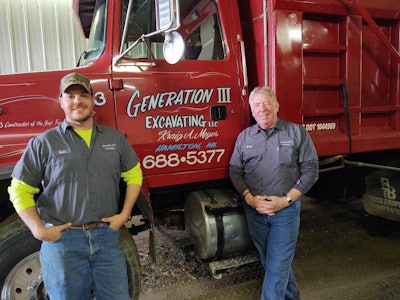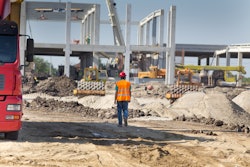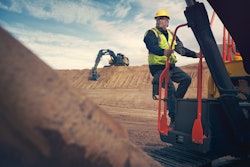When Pennsylvania Gov. Tom Wolfe announced late Monday that public and private construction would again be allowed starting on May 9th, Brad Clubb, president of Flyway Excavating in Mount Joy, Pennsylvania, was overjoyed. “We can’t wait to get everyone back to work and resume full production,” he says.
Michigan contractors are still waiting for such a date, however, as are those working within the Boston city limits.
Pennsylvania, Michigan and Boston are three places where construction has not only slowed because of the impacts of the COVID-19 coronavirus, the majority of it has shut down. Contractors adept at handling economic downturns are now faced with surviving light-switch orders to stop work. We talked with five contractors who are experiencing this new reality.
You can watch the video version of this story, featuring Zoom interviews of each of the contractors we interviewed, right here. Or, if you prefer text, read on below the break.
The land of uncertainty
Before Pennsylvania announced a construction start date, contractors dealing with the state’s shutdown were working blind. Speaking to Equipment World last week, Robert Brash, president of commercial site developer Roice Construction, Allison Park, Pennsylvania, said: “We’re in freefall. There’s no way to gauge where we’re going to go, when this is going pick up and how it’s going to pick up now in our state.”
Michigan contractors not engaging in work deemed essential have been under Gov. Gretchen Whitmer’s stay-at-home directive since March 24th. “It’s hard to know exactly what to expect and what to plan for,” says Joyce Oliver with Total Asphalt Paving, Ray Township, Michigan, located just north of Detroit. “There’s not a whole lot of anything going on.”
 Clubb
ClubbTwo days before Pennsylvania shut down, Clubb got wind of the impending quarantine. That gave the 32-year-old company just enough time to button down its ongoing sites, bring the equipment back to the yard and turn in its rental machines. “Our governor came up with his own provisions, enacted them early with no notice and caught a lot of people off guard,” says Clubb.
The company furloughed most of Flyway’s 30-plus employees, keeping only five in the field to work on the few projects the state allowed. Executives took a 60 percent pay cut, but for the few who did stay behind to pay bills and process unemployment claims, that cut was less in proportion to the hours they put in at the office, Clubb says.
“Everybody was willing to do that. It was that or possibly laying them off,” Clubb says. “The state says you have to shut down, but you still have bills to pay, you still have unemployment claims to process, and there is still plenty to do. We talked among the four owners and decided that made sense and talked to the guys to make sure they could sustain themselves for a few weeks.”
Season just starting
When the Michigan order came down, Generation III Excavating, a $1.3 million contractor in the western Michigan town of Hamilton, was just ramping up for the season. Weight restrictions were coming off and the company had projects lined up, says Kraig Meyer who owns the company along with his wife, Cindy, and son Heath.
“We were just about ready to get fired up, and all of the sudden, this thing comes along and shuts everything down,” Meyer says. “We figured it would be a short-lived deal, and we were just going to ride it out and keep everyone on payroll and find some stuff to do around the shop.”
But by March 28th, the Meyers had laid everyone off. “We were seeing law enforcement stopping dump trucks on the road and asking whether what they were doing was essential or not,” Meyer says.
The Michigan shutdown is especially tough this time of year, Oliver says: “We get a lot of work in March and April. Those phone calls have almost completely died off.” But when people do reach out for a quote, she says, she knows “they’re serious about it. They still have the money, and they definitely want to get the work done.”
 Bob and Joyce Oliver own Total Asphalt Paving in Ray Township, Michigan.
Bob and Joyce Oliver own Total Asphalt Paving in Ray Township, Michigan.Total Asphalt’s seasonal crews would typically be returning to the company now, and there’s some worry there, says Oliver. “They’re all anxious to get back to work. You want to make sure they have a job when they do come back and that we have work to do. Because that’s obviously the other concern – once we get the go-ahead, hopefully people are going to still have the money to spend to get work done.”
The Meyers were able to take advantage of the Small Business Administration’s Paycheck Protection Program. “We’ve got everybody back on the payroll even though we’re not working at this time,” Cindy Meyer says. Working through their proactive community bank, she sent the required documents in on a Tuesday and “we had the money in our account by Thursday,” she says. “That’s not the story I’ve been hearing from other contractors.”
Partial shutdown
Boston was the first area in the U.S. to shut construction down, with Mayor Martin Walsh issuing the order March 16th. “We’ve been holding our own,” says James MacKay, owner of MacKay Construction, Wilmington, Massachusetts. This is despite the fact that half of his jobs are now shut down within the Boston city limits.
 James MacKay with daughters Aryanna and Alyza at World of Concrete: “I don’t want to bring this home to my family.”
James MacKay with daughters Aryanna and Alyza at World of Concrete: “I don’t want to bring this home to my family.”“It was just going to be a couple of weeks,” he says about the ban, which is now in its second month. And MacKay doesn’t see Boston construction opening up until May 15th or later. “It obviously hurts to not work in Boston because that’s a big percentage of our work.”
MacKay, a $20 million union civil site and roadwork contractor, has been able to keep his 60 employees busy and has actually hired five people since the Boston shutdown. “We’re chasing jobs on the outskirts of Boston, and we’ve got a good mix of public and private work,” MacKay says. The five extra employees he hired have specialized skills in setting granite curbs. “We were able to bring them in because we had so much of that work going on,” he says.
New jobsite rules
MacKay estimates he’s spending $10,000 to $15,000 a month for added safety measures, including disinfectant, gloves, hand sanitizer and face masks. His company has put in foot-operated, hot-water hand-washing stations outside the portable toilets on some sites. “Each site dictates a different protocol,” he says.
And each operator is given a can of Lysol to spray machines down. MacKay tells them, “I don’t care if you’re the only one running it, just don’t take a chance. There’s no need of it, and you could lose two weeks at a minimum.”
These protocols won’t go away anytime soon, MacKay contends. “I think this is going to be the way of life for about a year.” He anticipates as much as a 20 percent decrease in production as crews are forced to wear face masks in the summer heat.
Total Asphalt is putting together COVID-19 safety guidelines for its employees, detailing the protocols that need to be in place, Oliver says. “We can’t mess this up because we can’t be shut down for carelessness of people being too close together or not washing their hands or whatever it might be,” she says.
Two big challenges Clubb sees in the future are social distancing and CDL drivers. “In construction you have the ability to socially distance on jobsites,” he says. “We only have five guys working in the field and they’re not sharing cabs anyway. Our biggest challenge is that some of our jobsites are an hour to an hour and half away and our guys ride out there together, two or three or more, in a truck. We’re definitely going to have to come up with a better plan when we’re busier.” And CDL drivers may be lured away by other companies and not come back to their construction jobs.
Will they buy?
When we talked to Brash last week he told us a pending new machine purchase was “100 percent on hold.” Now that the Pennsylvania governor has said public and private construction can start back up on May 9th, Brash says the “work stoppage won’t have much impact on equipment purchases.”
MacKay has two backhoes on order, which he hasn’t cancelled, and he’s looking at adding two crew cab trucks in addition to a wheeled excavator. “Luckily we did some bigger purchases last year,” he says. What has decreased is the amount of equipment he rents. “I’m not renting anything right now because we don’t have the fallback work like we usually do. All of my machines are available for my use.”
 Heath and Kraig Meyer with Generation III Excavating: ““When you don’t have debt, you don’t have a lot of worry.”
Heath and Kraig Meyer with Generation III Excavating: ““When you don’t have debt, you don’t have a lot of worry.”Generation III Excavating had just taken delivery of a trailer in January and was looking at adding a new dump truck and skid steer but then opted not to go forward. “Fortunately for us, that was a good decision,” Meyer says. He will rent, however. “It’s far easier to rent when it’s this kind of a situation because you don’t have the out-of-pocket.”
A few silver linings have emerged. Dealer service technicians were not forced to stop working, so now it’s much easier to get maintenance and repairs, says Clubb. “We are taking advantage of that,” he says. “We’re having some maintenance done while the machines are just sitting, and doing some upkeep in our shop to keep people busy.”
Flyway buys mostly new or nearly new equipment, so Clubb doesn’t see any advantage in bargain hunting during the shutdown. “We run a two- or three-year plan and try to level it out,” he says. “We may slim things down a little bit, but we had a discussion the other day and decided to go ahead on an RPO for a compact loader we wanted. We had a Mack dump truck on order, and we’re not going to change anything on that. And we’re getting ready to order another mechanics service truck. We may be a little more conservative, but we’re not stopping things by any means.”
Downtime
 Brash
Brash“We are catching up on a lot of things that we normally don’t have time to do,” Brash says. “There’s always a little backlog of equipment, maintenance, paperwork, things that when you’re busy get pushed aside. Now we’re caught up better than we’ve ever been. But in the next week or so, we’re going to be out of the little things to do. I just want to be ready when they say go back to work, and strictly focus on projects.”
Generation III can do limited work, as long as it’s for a client such as a utility or an agricultural customer. When Equipment World talked to the Meyers the week of April 13th, they had a small two-day job for an agricultural customer – a client that gave them a letter to show law enforcement. “As of March 31st, you have to have a letter stating that you are considered essential for what you are doing,” Kraig Meyer explains.
Public impressions come into play. “Everyone’s got a camera in their pocket nowadays,” Meyer says. “So from a business standpoint, you’ve got to be a little careful on what you’re going to do.” Current Michigan restrictions are in place until April 30th.
Asphalt plants will soon be running in Michigan, and state DOT work will also be happening, says Oliver. “So we’re hoping that that’s going to be a door to let us get into being able to do some work. If the state is doing construction, maybe we can kind of fit into the same guidelines.”
Different perspective
Experience helps when viewing the impacts of the shutdown.
Kraig and Cindy Meyer have a different perspective on the situation than their son Heath who joined them about eight years ago and is now a partner.
“We lived through the shoestring startup, borrowing $500 from your life insurance policy as a down payment to buy your first dozer, and through the 2008 to 2012 downturn,” Kraig Meyer says. “When you don’t have debt, you don’t have a lot of worry. And it’s always been one of our goals to have well-maintained late-model equipment. So you get to the point where you can be a little callous to the downturn, especially when something comes on as quickly as this did.”
“We run pretty lean and we don’t carry a lot of debt,” Brash says, “which honestly came from a lot of turbulence of years of experience, dealing with different projects and delays and learning how to weather those storms.”
But Brash points out it’s not just about the health of his individual company: “There’s all these other moving parts that are going to have to be there when we go back to work. They’re part of the puzzle; otherwise, we’re not going to be able to work.”
The present and coming hit
“There’s still going to be a hit from all of this, obviously,” Oliver says, estimating it may be as much as 30 percent. “The longer it lasts, the bigger the hit. So we’re trying to be really hopeful and positive. If we can get going in May, it shouldn’t be too bad.”
“We just completed our March numbers, and with the extra compensation that we provided to all of our employees, we are showing a $100,000 loss in March on sales of just over $500,000,” Clubb says. “April will be much worse, as our sales will only be $100,000 when they should have been $1 million.”
“We had a good year last year, and we were in a position to have a very good year this year,” Clubb adds. “We were about at the break-even point going into this, but now, we’ll be lucky to hit the break-even point by July or August.”
“I’m still curious as to what the next few quarters will hold,” Brash says. “Is it going to be hard to find work? We don’t see projects until they are out for bid. The things that aren’t up yet on on our radar are going to be important.”
And if Boston doesn’t open up in mid-May? “I think if it goes beyond that, it’s going to be some tough times for everybody,” MacKay says. “Maybe some really tough times.”
Equipment World Executive Editor Tom Jackson contributed to this report.











